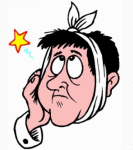
Trigeminal Neuralgia
Trigeminal neuralgia (TN) is a painful condition which is often confused with a toothache, leading to unnecessary dental treatments. The condition causes sharp and intense facial pain which may affect the teeth or jaw, resembling to the tooth pain caused by dental conditions such as a cracked tooth or abscess. Misdiagnosis is very often in cases of trigeminal neuralgia.
What is trigeminal neuralgia?
Trigeminal neuralgia, also known as tic douloureux, is actually a neuropathic disorder involving the trigeminal nerve system not related to teeth problems, although in some cases dental treatments may be the causative factor of the condition. It is a chronic pain condition that causes extreme, sporadic, sudden burning or shock-like face pain which seldom lasts more than a few seconds per episode.
The trigeminal nerve is one of the main cranial nerves which arises in the brain stem, enters the face and divides into three major branches - ophthalmic, maxillary and mandibular. Its function is to provide the senses of touch, pain and temperature in the facial area, and control the muscles used for chewing.
Trigeminal neuralgia is more likely to occur in people who are older than 50, and it is more often between women. It is listed as a rare disease affecting 4 to 5 patients per 100,000 people.
Trigeminal neuralgia or tooth pain?
Several conditions can cause a toothache which seems to be associated with a tooth. These include tmj disorders, sinusitis and even heart problems, but trigeminal neuralgia is definitely the one that is most difficult to be diagnosed.
The most common type of the condition, the typical trigeminal neuralgia, is characterized by episodes of intense pain that may be felt in eyes, ears, lips, nose, scalp, forehead, cheeks, teeth, or jaw or anywhere in the face. Sometimes the pain is so localized to specific teeth that even an experienced dentist will believe that a tooth is the origin of the pain.
The typical symptom of the condition, a sharp shock-like tooth pain that lasts for a few seconds, is almost identical to the one caused by a cracked tooth. In more advanced stages of trigeminal neuralgia the pain attacks become more frequent and severe such as in case of a tooth abscess.
The similarity of the symptoms of TN with the symptoms of very common dental problems is the reason why trigeminal neuralgia is so often misdiagnosed. This can lead to a series of unnecessary dental treatments that will not only fail to solve the problem but they can may actually make it worse.
TN specialists report that many of their patients had at least one not needed dental treatment before trigeminal neuralgia pain was diagnosed. The most common treatment that is usually performed first is a root canal. Even if a tooth may look healthy the dentist may proceed to the therapy to help the patient which is in severe tooth pain. As the pain will not stop after the treatment, the dentist may consider it as a failed root canal case and recommend a re-treatment. When this fails to relieve the pain it is not unusual to be followed by a tooth extraction.
The difficulty in successfully diagnosing trigeminal neuralgia is in part due to the lack of clinical, laboratory or radiological tests to confirm the disorder. Another cause is that the condition is very rare, so that a dentist who has a patient complaining about an unbearable pain in a tooth may not consider the possibility of TN as potential cause of the toothache.
Causes of trigeminal neuralgia pain
The most widely accepted hypothesis regarding the causes of typical trigeminal neuralgia pain is that it is caused by the compression of the trigeminal nerve which leads to demyelination (loss of the nerve’s myelin ‘cover’) triggering abnormal pain messages to the brain.
The compression of the trigeminal nerve may be the result of several conditions such as tumors, pressure from nearby blood vessels or aneurysms.
Physical damage of the nerve may also cause trigeminal neuralgia symptoms. Conditions that can damage the nerve include injuries, infections, craniofacial trauma, multiple sclerosis, and deterioration due to ageing.
The loss of the protective myelin layer around the nerve may cause erratic and hyperactive functioning of the trigeminal nerve, which starts to send strong pain signals to the nervous system at the slightest stimulation of any area served by the nerve. The damage may also affect the nerve's ability to stop sending these pain signals even after the stimulation has ended.
Trigeminal neuralgia pain caused by dental treatments
Damaging the trigeminal nerve may also occur accidentally during several dental treatments. This can cause a type of the condition known as Post-Traumatic Trigeminal Neuralgia or trigeminal neuropathy. The pain is usually constant, aching or burning, but may be worsened by exposure to triggers such as wind and cold.
In the best case scenario, the problem is only temporary (but lasting several months or years) as the nerve may be able to heal itself. Sometimes the nerve damage is irreparable leading to chronic trigeminal neuralgia pain. In these unfortunate cases, a treatment performed to relieve the patient of a toothache can leave the patient with a severe chronic facial or dental pain for the rest of his life.
Treatments that can have complications related to trigeminal nerve injury include surgical tooth extractions, oral surgery, sinus bone grafting, dental implant preparation or placement, and root canal treatments.
A dentist should always consider the possibility of trigeminal neuralgia before proceeding to invasive dental treatments for patients suffering from severe facial or dental pain without any other indication of a teeth related problem.

 Dental Insurance
Dental Insurance Toothache Medicines
Toothache Medicines